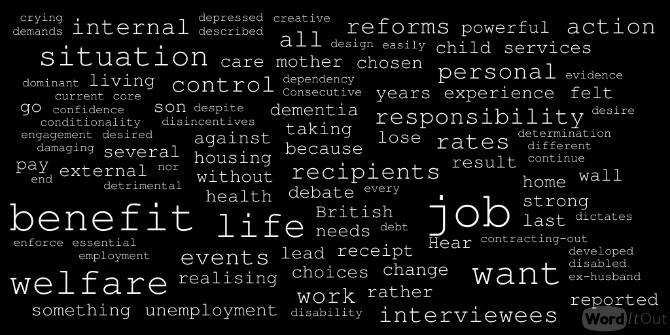Ruth Patrick and Sharon Wright highlight the positive lessons that the rest of the UK can learn from Scotland’s more flexible and empathetic approach to social security.
As the UK gears up for a General Election campaign it is as yet unclear which policy areas will dominate the debates and wrangling for votes. Many expect the problems with the NHS to feature prominently, but attention should also be directed to the nature and extent of poverty within the UK, and the potential role of social security policy in both addressing and preventing hardship. There is a pressing need to better understand variations in policy across different parts of the UK. While it is common to talk about a single UK social security system, this has not in fact been the case for some time.
What is different about Scotland?
This is most evident in Scotland, which has been using its additional devolved powers to charter a distinctive approach to social security, encompassing new benefits, a new agency for their administration, and a distinctive approach to the involvement of those with lived experiences in the development of policy. Under Nicola Sturgeon’s leadership, the Scottish Government introduced new legislation and created its own agency, Social Security Scotland, to process new benefits for which it has responsibility. These 14 benefits now include the Scottish Child Payment (flat-rate payments for children, available to households that get UK working age benefits) and an Adult Disability Payment, which replaces Personal Independent Payment in Scotland, and is currently being rolled out in pilot areas.
In Scotland, the Benefit Cap is also mitigated – meaning no Scottish household should experience a loss of income due to the cap, something which sets them apart from households in England and Wales (Northern Ireland also operates a mitigation). Scotland also has distinctive payment arrangements for Universal Credit, the main Westminster-controlled benefit for those of working age throughout the UK. Universal Credit claimants in Scotland can choose to receive their payment twice per month, instead of monthly, and opt to have the housing component paid to their landlord.
Scotland’s distinctive approach to social security was especially in evidence during the passage of the underpinning legislation. The 2018 Social Security (Scotland) Act is based on a series of principles, which provide a clear articulation of how social security is being understood in the Scottish context. Significantly, and progressively, we here see social security presented as an investment, and as a force for good, a clear departure from how it is popularly conceptualised south of the border. In developing this legislation, the Scottish Government created a series of ‘Experience Panels’, seeking to provide new ways for those with experiences of social security to contribute to these principles, and to input into the policy process.
What is also notable about the Scottish approach to social security is that the narrative and public conversation about poverty and the role of social security is distinctive, with politicians seemingly less ready to stigmatise households who are reliant on benefits for all or most of their income. While at Westminster we see politicians battle to find the harshest rhetoric in their efforts to talk tough on benefits, at Holyrood we instead find politicians ready to celebrate the role that a devolved social security system might play. For example, Ben Macpherson, Minister for Social Security says:
Social security is a collective endeavour – it is a collective investment in people. … our shared commitment to treat people with dignity, fairness and respect: to deliver social security not just as a public service – but as a common good and human right.
Scotland is sometimes held up as an example of a country pursuing a more progressive and compassionate approach to social security, with commentators from England often looking on with some envy at the very different rhetoric and narrative that routinely underpins policy announcements. Significantly, though, Scotland still only has responsibility for approximately 20% of its overall ‘social security’ budget, so decisions taken at Westminster continue to drive everyday lives in Scotland. Does this 20% offer us what has previously been described as a ‘slice of hope’? Are there already significant issues with how the new powers are being implemented? And what difference do the new powers make to those receiving social security for all or most of their income?
Social security claimants in Scotland must navigate two systems operating in parallel, with Universal Credit – and its intensive conditionality regime – still in operation north of the border, and alongside the Scottish approach, which places a rather different focus on the importance of fairness, dignity and respectful treatment. More needs to be done to understand how individuals navigate these different systems, and how far they understand that a Scottish Jobcentre Plus adviser sanctioning them in Glasgow is doing so under direction from a Department for Work and Pensions led by Westminster, whereas a Social Security Scotland adviser administering their family’s Scottish Child Payment is doing so under legislation coming from Holyrood.
Unsurprisingly, SNP politicians have repeatedly sought to emphasise the differences that exist, seeking political capital and support for independence in these divergences. This has been done most recently in differentiating between a Scottish Government that provides £25 for every child per week for low-income families through the Scottish Child Payment, and a UK Government (and UK Opposition) that remains committed to the two-child limit, which restricts child related benefits to the first two children in a household.
Understanding the devolution of social security
Scotland has had its own social security system for six years. In the intervening years, we have seen the rollout of new benefits in Scotland, as well as marked differences in how Universal Credit operates in Scotland. But how far do these actually improve things for those in receipt of social security for all or most of their income? And has the implementation of the policies matched the ambition and rhetoric that underpin them?
We would argue that while the positive attention on Scotland’s approach is well placed, this needs to be married with a close analysis of the implementation of new powers and policies, which is ideally best done through a comparative lens. More broadly, attention needs to be paid to the intersection of devolution and social security, an area that is under-researched and (with some notable exceptions) under-theorised.
We do not know yet whether social security and poverty will be hot political issues on the campaign trail and electoral news agenda this year. They certainly should be and it is critical that politicians are held to account for the hollowing out of UK social security provision over the past 14 years, and questioned by voters about how they will support households in the future if they secure office. In these debates, it will be vitally important to explore the differences in approach that have opened between Westminster and the Scottish Government, and to use the lessons from these to inform the future direction of policy. There is a pressing need to improve social security policy and design across the UK. As researchers, we want to support efforts to do just that.
All articles posted on this blog give the views of the author(s), and not the position of LSE British Politics and Policy, nor of the London School of Economics and Political Science.
Image credit: Patti Black on Unsplash







